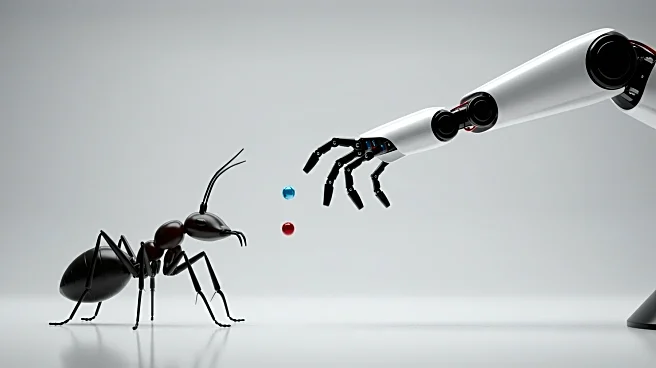What's Happening?
Researchers have identified a unique cooperative strategy employed by weaver ants that could revolutionize robotics. The study, published in Current Biology, reveals that individual weaver ants increase their pulling force as the group size grows, effectively doubling their efficiency. This finding contrasts with the historical observation by French engineer Max Ringelmann, who noted that human teams tend to decrease individual contributions as more members join. The research involved experiments where weaver ant colonies formed pulling chains to move artificial leaves connected to force meters. The ants divided their tasks into active pulling and anchoring, which allowed them to store and maximize pulling force.
Why It's Important?
The discovery of the weaver ants' cooperative strategy holds significant implications for the field of robotics. Current robotic teams often fail to increase their output when working collectively, unlike the ants. By programming robots to mimic these ant-inspired strategies, scientists could enhance the efficiency of autonomous robot teams, potentially transforming industries reliant on robotic labor. This could lead to advancements in manufacturing, logistics, and other sectors where teamwork and efficiency are crucial. The ability to increase individual contributions in larger teams could address longstanding challenges in human and robotic teamwork dynamics.
What's Next?
The next steps involve applying the ant-inspired strategies to robotic systems. Researchers, including Dr. Chris Reid, suggest that programming robots to adopt these cooperative mechanisms could lead to more efficient robotic teams. This approach may require developing new algorithms and technologies to simulate the ants' force ratchet mechanism, where some robots act as anchors while others actively pull. The potential success of this application could prompt further research into biological systems to inspire technological innovations.
Beyond the Headlines
The study not only impacts robotics but also offers insights into the broader understanding of cooperation in biological systems. It challenges the traditional view of teamwork efficiency and could inspire new approaches in organizational behavior and management. The ethical implications of using biological strategies in technology also warrant consideration, as it raises questions about the integration of natural processes into artificial systems.










